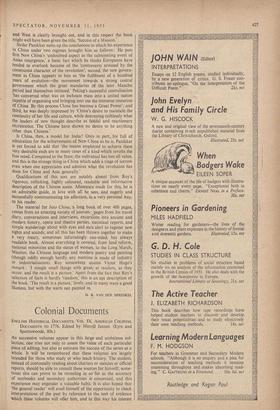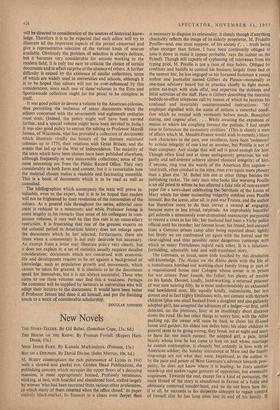Colonial Documents
ENGLISH HISTORICAL DOCUMENTS. VOL. IX. AMERICAN COLONIAL
As successive volumes appear in this large and ambitious col- lection., one tries not only to assess the value of each particular piece of editing, but also to estimate the success of the series as a whole. It will be remembered that these volumes are largely intended for those who study or who teach history. The student, instead of continually reading about Charters or statutes or official reports, should be able to consult these sources for himself; some- times this can prove to be revealing in so far as the accuracy of textbooks and secondary authorities is concerned, and, this experience may engender a valuable habit. It is also hoped that 'the general reader' will avail himself of the opportunity to check interpretations of the past by reference to the sort of evidence Which these volumes will offer him, and in this way his interest will be directed to consideration of the sources of historical know- ledge. Therefore it is to be expected that each editor will try to illustrate all the important aspects of the period concerned and give a representative selection of the various kinds of sources available. Obviously the problem of selection is always delicate, but it becomes very considerable for anyone working in the modern field; it is only too easy to criticise the choice of certain documents and to affect surprise at the absence of others. A further difficulty is caused by the existence of similar collections, some of which are widely used in universities and schools, although it is to be hoped that editors will not be over-influenced by this consideration, since each one of these-volumes in the Eyre and Spottiswoode collection ought (at the price) to be complete in itself.
It was good policy to devote a volume to the American colonies, thus permitting the inclusion of many documents which the editors concerned with the seventeenth and eighteenth centuries must omit. (Indeed, the policy might well have been carried farther, and a special volume might have been devoted to India.) It was also good policy-to entrust the editing to Professor Merrill Jensen, of Wisconsin, who has provided a collection of documents which illustrate vividly the history of the thirteen mainland colonies up to 1776, their relations with Great Britain, and the events that led. up to the War of Independence. The majority of the texts which have been chosen have been published elsewhere, although frequently in very inaccessible collections; some of the most interesting are from the Public Record Office. They vary considerably in both form and content, but it is remarkable how the material chosen makes a readable and fascinating ensemble. This is a book of documents which is to be read as well as consulted.
The bibliographies which accompany the texts will prove in- valuable, even to the expert, but it is to be hoped that readers will not be frightened by their revelation of the immensities of the subject. As a general rule throughout the series, editorial com- ment is reduced to a minimum; and while Professor Jenseal is more lengthy in his remarks than some of his colleagues in com- panion volumes, it may well be that this rule is an unnecessary restriction. It is frustrating that one of the greatest experts on the colonial period in American history does not enlarge upon the documents which he has selected; furthermore, there are times when a commentary is not only desirable but necessary. An excerpt from a letter may illustrate policy very clearly, but it does not explain it; a set of statistics usually requires detailed consideration; documents which are concerned with economic life and development require to be set against a background of knowledge, such as population growth and movements, which cannot be taken for granted. It is idealistic to let the documents speak for themselves, but it is not always successful. Those who come to use these volumes may find this a weakness. Perhaps the comment will be supplied by lecturers in universities who will adapt their lectures to the documents. It would have been better if Professor Jensen had done it all himself, and put the finishing touch to a work of considerable scholarship.
DOUGLAS JOHNSON



































 Previous page
Previous page